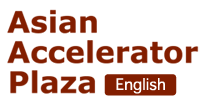Korea to build new science and business city
Since the leadership of its President Lee Myung-bak, Korea has placed high value on science and technology. On 13 January, the government officially signed a contract for a big project to build an international science and business belt that includes the establishment of a new institute, the Asian Basic Science Institute (ABSI), and the construction of a Rare Isotope Accelerator (RIA).
This project is a part of the Presidential Council on Future and Vision, presented to President Lee in a meeting of the National Science and Technology Council. The "Vision" designated the three core industries the government would be concentrating on to build new engines of growth for Korea: green technology, high-tech convergence and value-added services. The government will inject more than 6.3 trillion Won (4.6 billion dollars) to implement the overall R&D projects over the next four years, and more than 3.5 trillion Won (2.6 billion dollars) will be put into the new science-business belt project. The investment to build the core laboratory for the project, the rare isotope accelerator, will be 460 billion Won (0.33 billion dollars), Korea thus aiming to build an accelerator with world-class performance. This will be the first heavy ion accelerator in Korea, and the sixth in the world. The construction will start from 2012, and is planned to finish by 2015.
ABSI, whose construction will be finished by 2012, is planned to be a core laboratory with 3000 scientists and staff. To attract excellent scientists and other professionals from over the world, the project includes the creation of a new city with a superb educational, cultural environment, and comfortable living environment for an international community. The site for this new science and business city has not been officially decided yet, and will be announced in the first half of this year.
